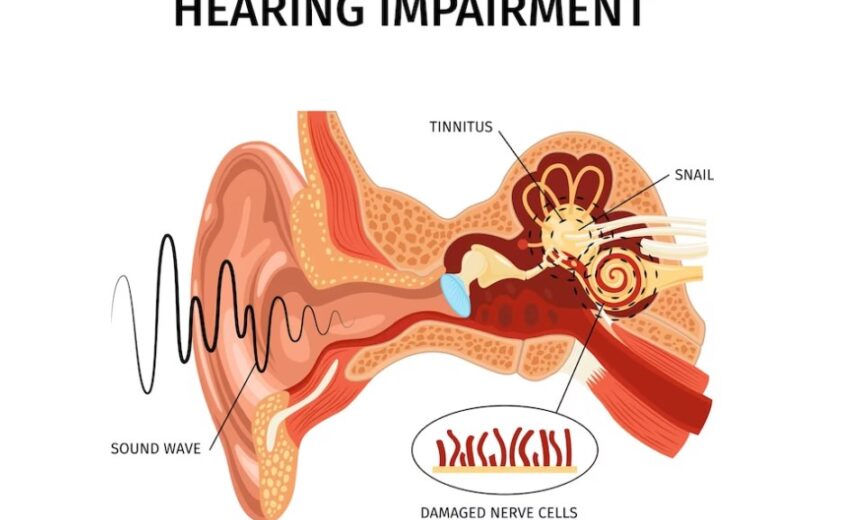Hypertension-Induced Tinnitus: Causes, Symptoms, and Management

It’s no news that hypertension, or high blood pressure, is a precursor to various health complications, but not many people realize it can also trigger a lesser-known condition known as tinnitus, commonly described as a constant ringing or buzzing in the ears. It can be a result of several factors, and high blood pressure is one such key contributor.
This article delves deep into understanding hypertension-induced tinnitus, helping you to grasp its causes, symptoms, and how it can be managed effectively.
Unraveling Tinnitus and Pulsatile Tinnitus
Tinnitus, a condition often alluded to as the ‘phantom noise’ of the auditory system, triggers a perception of sound when no actual external noise is present. This sensation can manifest as a buzzing, hissing, whistling, or ringing noise. Meanwhile, its subtype, pulsatile tinnitus, induces rhythmic sounds in the ear that often sync up with one’s pulse. This can give the impression of hearing your own heartbeat or a swishing sound in your ear.

Pulsatile tinnitus, often associated with somatosounds (body-produced noises audible only to the person themselves), is caused by changes in blood flow, either through the blood vessels near the ear or the ear itself. There’s a wide array of potential triggers, including:
- Hypertension or high blood pressure;
- Atherosclerosis or hardening of the arteries;
- Head or neck tumors;
- Turbulent blood flow, also known as arteriovenous malformations.
With these conditions, the blood flow becomes turbulent, disrupting the normal rhythm, and causing the characteristic pulsating sounds of pulsatile tinnitus. Understanding these complexities can help shape effective strategies to manage and treat this auditory condition.
Decoding High Blood Pressure
Imagine a network of roads with vehicles zipping past. Now, think of blood vessels as these roads, and blood cells as the vehicles. The ‘speed’ or ‘pressure’ of these ‘vehicles’ is your blood pressure. When the force exerted by your blood on your artery walls is too high, you have hypertension.

An optimal blood pressure level is generally considered to be around 120/80 mm Hg. The systolic pressure (first number) signifies the pressure when your heart beats and pumps blood around your body. The diastolic pressure (second number) represents the pressure when your heart rests between beats. Hypertension kicks in when these numbers consistently soar above 130/80 mm Hg.
High blood pressure is often branded as a ‘silent killer’ since it rarely exhibits early symptoms but can lead to serious complications, including heart disease, stroke, and even auditory issues such as ear noise.
The Intersection of Hypertension and Tinnitus
A myriad of research has shed light on the intricate relationship between high blood pressure and the manifestation of ear buzzing. Elevated blood pressure, or hypertension, may trigger abnormalities in blood flow patterns, creating turbulence that results in pulsatile tinnitus – the experience of rhythmic sounds that often beat in time with the individual’s pulse.
Furthermore, an interesting facet of this correlation is the role of specific medications used in treating hypertension. For instance, loop diuretics, a class of drugs often prescribed for blood pressure management, could inadvertently contribute to phantom noise. This intertwined relationship between hypertension and tinnitus illustrates the complexity of their mutual influence and the subsequent necessity for personalized, informed healthcare decisions.

Grasping the depth of this correlation is essential, as it opens the door for targeted treatments specifically catered to hypertension-induced tinnitus. Routine monitoring of blood pressure levels and timely consultations with healthcare professionals are pivotal, especially for individuals experiencing continuous auditory disturbances. This becomes even more critical for individuals with a known history or suspected case of hypertension.
Managing Hypertension-Induced Tinnitus
Addressing hypertension-induced tinnitus primarily involves managing the underlying high blood pressure condition. This usually includes a dual-pronged approach involving medication and lifestyle modifications. Here are a few steps to consider:
- Medication: A range of medications are available to treat hypertension, including diuretics, beta-blockers, and ACE inhibitors. Your healthcare provider will recommend the most suitable treatment based on your health history and current condition;
- Lifestyle Modifications: Regular exercise, a balanced diet, and stress management can go a long way in regulating blood pressure. Cutting back on caffeine, alcohol, and quitting smoking are also beneficial.
Successfully controlling hypertension can often result in a notable reduction or even elimination of tinnitus symptoms.
Lifestyle Modifications and Additional Solutions
Besides managing hypertension, there exists a range of strategies to help alleviate the symptoms of ear buzzing. These can be considered complementary to medical interventions and can offer considerable relief when implemented appropriately:
- Sound Therapy: Sound therapy works on the principle of ‘distraction’. By filling your auditory environment with background noise, such as white noise or ambient nature sounds, the focus shifts away from the intrusive sounds of tinnitus, thereby reducing its perceived intensity;
- Cognitive Behavioral Therapy (CBT): CBT is a form of psychotherapy designed to transform the way you process and react to ear phantom noise. It doesn’t eliminate the noise but helps manage the emotional and psychological reactions to it, effectively reducing stress and improving the overall quality of life;
- Tinnitus Retraining Therapy (TRT): TRT is a specialized form of therapy that aims to ‘reprogram’ the brain’s auditory processing centers to become desensitized to phantom sounds, gradually reducing its impact on daily life.
In the face of hypertension-induced tinnitus, the journey may seem daunting, but remember, a multi-faceted approach involving medical treatments and lifestyle modifications can effectively control and even mitigate the symptoms. Over time, this can lead to substantial improvements in overall well-being and quality of life.
Key Takeaways
| Key Point | Brief Description |
|---|---|
| Tinnitus and Pulsatile Tinnitus | Tinnitus refers to perceived sounds in the ears with no external source. Pulsatile tinnitus, its subtype, manifests as rhythmic noises often synced with the pulse. |
| High Blood Pressure | High blood pressure or hypertension happens when the force of blood against artery walls consistently exceeds 130/80 mm Hg. |
| Hypertension and Tinnitus | Hypertension can lead to ear buzzing, either through blood flow turbulence or as a side effect of certain medications. |
| Management of Hypertension-Induced Tinnitus | This involves addressing the root cause—high blood pressure—through medication and lifestyle modifications. |
| Additional Solutions | These include lifestyle changes, sound therapy, cognitive behavioral therapy (CBT), and ear noise retraining therapy (TRT). |
Conclusion
When it comes to hypertension-induced tinnitus, understanding is the first, most crucial step in managing this auditory disturbance. The intertwining of hypertension and phantom noise may seem complex, but it’s this interconnectedness that offers a clear roadmap for treatment and management.
By grasping the concepts of tinnitus, pulsatile tinnitus, and the implications of high blood pressure, one can better navigate the healthcare options available. It’s not just about medical treatments – although they are crucial – but also lifestyle changes and alternative therapies. Each individual can tailor their approach, using these strategies as building blocks toward an improved quality of life.
It’s essential to remember that although hypertension-induced tinnitus may seem daunting, it’s a condition that many people successfully manage every day. The information provided in this article arms you with the knowledge you need to begin this journey. Whether it’s understanding the potential causes, identifying the symptoms, knowing when to seek professional help, or finding ways to manage tinnitus symptoms – each piece of the puzzle helps you towards better health and well-being.








